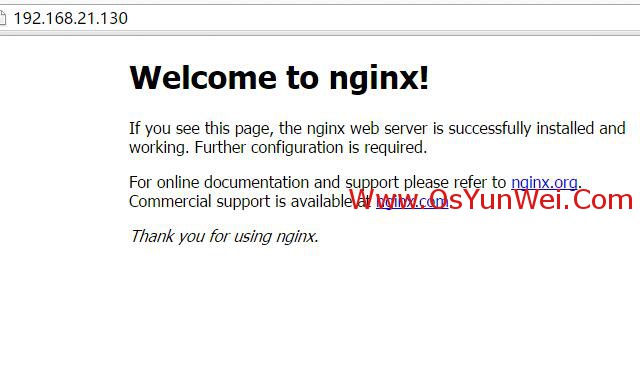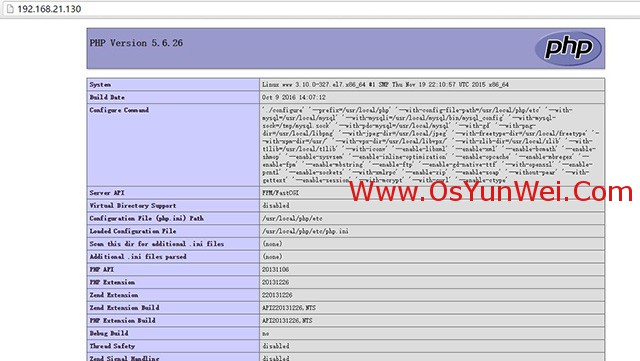|
准备篇 一、防火墙配置 CentOS 7.x默认使用的是firewall作为防火墙,这里改为iptables防火墙。 1、关闭firewall: systemctl stop firewalld.service #停止firewall systemctl disable firewalld.service #禁止firewall开机启动 2、安装iptables防火墙 yum install iptables-services #安装 vi /etc/sysconfig/iptables #编辑防火墙配置文件 # sample configuration for iptables service # you can edit this manually or use system-config-firewall # please do not ask us to add additional ports/services to this default configuration *filter :INPUT ACCEPT [0:0] :FORWARD ACCEPT [0:0] :OUTPUT ACCEPT [0:0] -A INPUT -m state --state RELATED,ESTABLISHED -j ACCEPT -A INPUT -p icmp -j ACCEPT -A INPUT -i lo -j ACCEPT -A INPUT -p tcp -m state --state NEW -m tcp --dport 22 -j ACCEPT -A INPUT -p tcp -m state --state NEW -m tcp --dport 80 -j ACCEPT -A INPUT -p tcp -m state --state NEW -m tcp --dport 3306 -j ACCEPT -A INPUT -j REJECT --reject-with icmp-host-prohibited -A FORWARD -j REJECT --reject-with icmp-host-prohibited COMMIT :wq! #保存退出 systemctl restart iptables.service #最后重启防火墙使配置生效 systemctl enable iptables.service #设置防火墙开机启动 /usr/libexec/iptables/iptables.init restart #重启防火墙 二、关闭SELINUX vi /etc/selinux/config #SELINUX=enforcing #注释掉 #SELINUXTYPE=targeted #注释掉 SELINUX=disabled #增加 :wq! #保存退出 setenforce 0 #使配置立即生效 三 、系统约定 软件源代码包存放位置:/usr/local/src 源码包编译安装位置:/usr/local/软件名字 四、下载软件包 1、下载nginx http://nginx.org/download/nginx-1.10.1.tar.gz 2、下载MySQL http://cdn.mysql.com/Downloads/MySQL-5.6/mysql-5.6.33.tar.gz 3、下载php http://cn2.php.net/distributions/php-5.6.26.tar.gz 4、下载cmake(MySQL编译工具) https://cmake.org/files/v3.6/cmake-3.6.2.tar.gz 5、下载pcre (支持nginx伪静态) ftp://ftp.csx.cam.ac.uk/pub/software/programming/pcre/pcre-8.39.tar.gz 6、下载openssl(nginx扩展) https://www.openssl.org/source/openssl-1.0.2j.tar.gz 7、下载zlib(nginx扩展) http://zlib.net/zlib-1.2.8.tar.gz 8、下载libmcrypt(php扩展) http://nchc.dl.sourceforge.net/project/mcrypt/Libmcrypt/2.5.8/libmcrypt-2.5.8.tar.gz 9、下载yasm(php扩展) http://www.tortall.net/projects/yasm/releases/yasm-1.3.0.tar.gz 10、t1lib(php扩展) ftp://sunsite.unc.edu/pub/Linux/libs/graphics/t1lib-5.1.2.tar.gz 11、下载gd库安装包 https://github.com/libgd/libgd/releases/download/gd-2.1.1/libgd-2.1.1.tar.gz 12、libvpx(gd库需要) http://ftp.osuosl.org/pub/blfs/conglomeration/libvpx/libvpx-1.6.0.tar.bz2 13、tiff(gd库需要) http://download.osgeo.org/libtiff/tiff-4.0.6.tar.gz 14、libpng(gd库需要) ftp://ftp.simplesystems.org/pub/libpng/png/src/libpng16/libpng-1.6.25.tar.gz 15、freetype(gd库需要) http://download.savannah.gnu.org/releases/freetype/freetype-2.7.tar.gz 16、jpegsrc(gd库需要) http://www.ijg.org/files/jpegsrc.v9b.tar.gz 以上软件包上传到/usr/local/src目录 五、安装编译工具及库文件(使用yum命令安装) yum install -y apr* autoconf automake bison bzip2 bzip2* cloog-ppl compat* cpp curl curl-devel fontconfig fontconfig-devel freetype freetype* freetype-devel gcc gcc-c++ gtk+-devel gd gettext gettext-devel glibc kernel kernel-headers keyutils keyutils-libs-devel krb5-devel libcom_err-devel libpng libpng-devel libjpeg* libsepol-devel libselinux-devel libstdc++-devel libtool* libgomp libxml2 libxml2-devel libXpm* libtiff libtiff* make mpfr ncurses* ntp openssl openssl-devel patch pcre-devel perl php-common php-gd policycoreutils telnet t1lib t1lib* nasm nasm* wget zlib-devel 系统运维 www.osyunwei.com 温馨提醒:qihang01原创内容©版权所有,转载请注明出处及原文链接 安装篇 以下是用putty工具远程登录到服务器,在命令行下面操作的 一、安装MySQL 1、安装cmake cd /usr/local/src tar zxvf cmake-3.6.2.tar.gz cd cmake-3.6.2 ./configure make make install 2、安装MySQL groupadd mysql #添加mysql组 useradd -g mysql mysql -s /bin/false #创建用户mysql并加入到mysql组,不允许mysql用户直接登录系统 mkdir -p /data/mysql #创建MySQL数据库存放目录 chown -R mysql:mysql /data/mysql #设置MySQL数据库存放目录权限 mkdir -p /usr/local/mysql #创建MySQL安装目录 cd /usr/local/src #进入软件包存放目录 tar zxvf mysql-5.6.33.tar.gz #解压 cd mysql-5.6.33 #进入目录 cmake . -DCMAKE_INSTALL_PREFIX=/usr/local/mysql -DMYSQL_DATADIR=/data/mysql -DSYSCONFDIR=/etc #配置 make #编译 make install #安装 rm -rf /etc/my.cnf #删除系统默认的配置文件(如果默认没有就不用删除) cd /usr/local/mysql #进入MySQL安装目录 ./scripts/mysql_install_db --user=mysql --basedir=/usr/local/mysql --datadir=/data/mysql #生成mysql系统数据库 ln -s /usr/local/mysql/my.cnf /etc/my.cnf #添加到/etc目录的软连接 cp ./support-files/mysql.server /etc/rc.d/init.d/mysqld #把Mysql加入系统启动 chmod 755 /etc/init.d/mysqld #增加执行权限 chkconfig mysqld on #加入开机启动 vi /etc/rc.d/init.d/mysqld #编辑 basedir=/usr/local/mysql #MySQL程序安装路径 datadir=/data/mysql #MySQl数据库存放目录 :wq! #保存退出 service mysqld start #启动 vi /etc/profile #把mysql服务加入系统环境变量:在最后添加下面这一行 export PATH=$PATH:/usr/local/mysql/bin :wq! #保存退出 source /etc/profile #使配置立刻生效 下面这两行把myslq的库文件链接到系统默认的位置,这样你在编译类似PHP等软件时可以不用指定mysql的库文件地址。 ln -s /usr/local/mysql/lib/mysql /usr/lib/mysql ln -s /usr/local/mysql/include/mysql /usr/include/mysql mkdir /var/lib/mysql #创建目录 ln -s /tmp/mysql.sock /var/lib/mysql/mysql.sock #添加软链接 mysql_secure_installation #设置Mysql密码,根据提示按Y 回车输入2次密码 二、安装Nginx 1、安装pcre cd /usr/local/src mkdir /usr/local/pcre tar zxvf pcre-8.39.tar.gz cd pcre-8.39 ./configure --prefix=/usr/local/pcre make make install 2、安装openssl cd /usr/local/src mkdir /usr/local/openssl tar zxvf openssl-1.0.2j.tar.gz cd openssl-1.0.2j ./config --prefix=/usr/local/openssl make make install vi /etc/profile export PATH=$PATH:/usr/local/openssl/bin :wq! source /etc/profile 3、安装zlib cd /usr/local/src mkdir /usr/local/zlib tar zxvf zlib-1.2.8.tar.gz cd zlib-1.2.8 ./configure --prefix=/usr/local/zlib make make install 4、安装Nginx groupadd www useradd -g www www -s /bin/false cd /usr/local/src tar zxvf nginx-1.10.1.tar.gz cd nginx-1.10.1 ./configure --prefix=/usr/local/nginx --without-http_memcached_module --user=www --group=www --with-http_stub_status_module --with-http_ssl_module --with-http_gzip_static_module --with-openssl=/usr/local/src/openssl-1.0.2j --with-zlib=/usr/local/src/zlib-1.2.8 --with-pcre=/usr/local/src/pcre-8.39 注意:--with-openssl=/usr/local/src/openssl-1.0.2j --with-zlib=/usr/local/src/zlib-1.2.8 --with-pcre=/usr/local/src/pcre-8.39指向的是源码包解压的路径,而不是安装的路径,否则会报错 make make install /usr/local/nginx/sbin/nginx #启动Nginx 设置nginx开机启动 vi /etc/rc.d/init.d/nginx #编辑启动文件添加下面内容 ############################################################ #!/bin/sh # # nginx - this script starts and stops the nginx daemon # # chkconfig: - 85 15 # description: Nginx is an HTTP(S) server, HTTP(S) reverse \ # proxy and IMAP/POP3 proxy server # processname: nginx # config: /etc/nginx/nginx.conf # config: /usr/local/nginx/conf/nginx.conf # pidfile: /usr/local/nginx/logs/nginx.pid # Source function library. . /etc/rc.d/init.d/functions # Source networking configuration. . /etc/sysconfig/network # Check that networking is up. [ "$NETWORKING" = "no" ] && exit 0 nginx="/usr/local/nginx/sbin/nginx" prog=$(basename $nginx) NGINX_CONF_FILE="/usr/local/nginx/conf/nginx.conf" [ -f /etc/sysconfig/nginx ] && . /etc/sysconfig/nginx lockfile=/var/lock/subsys/nginx make_dirs() { # make required directories user=`$nginx -V 2>&1 | grep "configure arguments:" | sed 's/[^*]*--user=\([^ ]*\).*/\1/g' -` if [ -z "`grep $user /etc/passwd`" ]; then useradd -M -s /bin/nologin $user fi options=`$nginx -V 2>&1 | grep 'configure arguments:'` for opt in $options; do if [ `echo $opt | grep '.*-temp-path'` ]; then value=`echo $opt | cut -d "=" -f 2` if [ ! -d "$value" ]; then # echo "creating" $value mkdir -p $value && chown -R $user $value fi fi done } start() { [ -x $nginx ] || exit 5 [ -f $NGINX_CONF_FILE ] || exit 6 make_dirs echo -n $"Starting $prog: " daemon $nginx -c $NGINX_CONF_FILE retval=$? echo [ $retval -eq 0 ] && touch $lockfile return $retval } stop() { echo -n $"Stopping $prog: " killproc $prog -QUIT retval=$? echo [ $retval -eq 0 ] && rm -f $lockfile return $retval } restart() { #configtest || return $? stop sleep 1 start } reload() { #configtest || return $? echo -n $"Reloading $prog: " killproc $nginx -HUP RETVAL=$? echo } force_reload() { restart } configtest() { $nginx -t -c $NGINX_CONF_FILE } rh_status() { status $prog } rh_status_q() { rh_status >/dev/null 2>&1 } case "$1" in start) rh_status_q && exit 0 $1 ;; stop) rh_status_q || exit 0 $1 ;; restart|configtest) $1 ;; reload) rh_status_q || exit 7 $1 ;; force-reload) force_reload ;; status) rh_status ;; condrestart|try-restart) rh_status_q || exit 0 ;; *) echo $"Usage: $0 {start|stop|status|restart|condrestart|try-restart|reload|force-reload|configtest}" exit 2 esac ############################################################ :wq! #保存退出 chmod 775 /etc/rc.d/init.d/nginx #赋予文件执行权限 chkconfig nginx on #设置开机启动 /etc/rc.d/init.d/nginx restart #重启 在浏览器中打开服务器IP地址,会看到下面的界面,说明Nginx安装成功。
三、安装php 1、安装yasm cd /usr/local/src tar zxvf yasm-1.3.0.tar.gz cd yasm-1.3.0 ./configure make make install 2、安装libmcrypt cd /usr/local/src tar zxvf libmcrypt-2.5.8.tar.gz cd libmcrypt-2.5.8 ./configure make make install 3、安装libvpx cd /usr/local/src tar xvf libvpx-v1.3.0.tar.bz2 cd libvpx-v1.3.0 ./configure --prefix=/usr/local/libvpx --enable-shared --enable-vp9 make make install 4、安装tiff cd /usr/local/src tar zxvf tiff-4.0.6.tar.gz cd tiff-4.0.6 ./configure --prefix=/usr/local/tiff --enable-shared make make install 5、安装libpng cd /usr/local/src tar zxvf libpng-1.6.25.tar.gz cd libpng-1.6.25 ./configure --prefix=/usr/local/libpng --enable-shared make make install 6、安装freetype cd /usr/local/src tar zxvf freetype-2.7.tar.gz cd freetype-2.7 ./configure --prefix=/usr/local/freetype --enable-shared make #编译 make install #安装 7、安装jpeg cd /usr/local/src tar zxvf jpegsrc.v9b.tar.gz cd jpeg-9b ./configure --prefix=/usr/local/jpeg --enable-shared make #编译 make install #安装 8、安装libgd cd /usr/local/src tar zxvf libgd-2.1.1.tar.gz #解压 cd libgd-2.1.1 #进入目录 ./configure --prefix=/usr/local/libgd --enable-shared --with-jpeg=/usr/local/jpeg --with-png=/usr/local/libpng --with-freetype=/usr/local/freetype --with-fontconfig=/usr/local/freetype --with-xpm=/usr/ --with-tiff=/usr/local/tiff --with-vpx=/usr/local/libvpx #配置 make #编译 make install #安装 9、安装t1lib cd /usr/local/src tar zxvf t1lib-5.1.2.tar.gz cd t1lib-5.1.2 ./configure --prefix=/usr/local/t1lib --enable-shared make without_doc make install 10、安装php 注意:如果系统是64位,请执行以下两条命令,否则安装php会出错(32位系统不需要执行) \cp -frp /usr/lib64/libltdl.so* /usr/lib/ \cp -frp /usr/lib64/libXpm.so* /usr/lib/ cd /usr/local/src tar -zvxf php-5.6.26.tar.gz cd php-5.6.26 export LD_LIBRARY_PATH=/usr/local/libgd/lib ./configure --prefix=/usr/local/php --with-config-file-path=/usr/local/php/etc --with-mysql=/usr/local/mysql --with-mysqli=/usr/local/mysql/bin/mysql_config --with-mysql-sock=/tmp/mysql.sock --with-pdo-mysql=/usr/local/mysql --with-gd --with-png-dir=/usr/local/libpng --with-jpeg-dir=/usr/local/jpeg --with-freetype-dir=/usr/local/freetype --with-xpm-dir=/usr/ --with-vpx-dir=/usr/local/libvpx/ --with-zlib-dir=/usr/local/zlib --with-t1lib=/usr/local/t1lib --with-iconv --enable-libxml --enable-xml --enable-bcmath --enable-shmop --enable-sysvsem --enable-inline-optimization --enable-opcache --enable-mbregex --enable-fpm --enable-mbstring --enable-ftp --enable-gd-native-ttf --with-openssl --enable-pcntl --enable-sockets --with-xmlrpc --enable-zip --enable-soap --without-pear --with-gettext --enable-session --with-mcrypt --with-curl --enable-ctype #配置 make #编译 make install #安装 cp php.ini-production /usr/local/php/etc/php.ini #复制php配置文件到安装目录 rm -rf /etc/php.ini #删除系统自带配置文件 ln -s /usr/local/php/etc/php.ini /etc/php.ini #添加软链接到 /etc目录 cp /usr/local/php/etc/php-fpm.conf.default /usr/local/php/etc/php-fpm.conf #拷贝模板文件为php-fpm配置文件 ln -s /usr/local/php/etc/php-fpm.conf /etc/php-fpm.conf #添加软连接到 /etc目录 vi /usr/local/php/etc/php-fpm.conf #编辑 user = www #设置php-fpm运行账号为www group = www #设置php-fpm运行组为www pid = run/php-fpm.pid #取消前面的分号 :wq! #保存退出 设置 php-fpm开机启动 cp /usr/local/src/php-5.6.26/sapi/fpm/init.d.php-fpm /etc/rc.d/init.d/php-fpm #拷贝php-fpm到启动目录 chmod +x /etc/rc.d/init.d/php-fpm #添加执行权限 chkconfig php-fpm on #设置开机启动 vi /usr/local/php/etc/php.ini #编辑配置文件 找到:disable_functions = 修改为:disable_functions = passthru,exec,system,chroot,scandir,chgrp,chown,shell_exec,proc_open,proc_get_status,ini_alter,ini_alter,ini_restore,dl,openlog,syslog,readlink,symlink,popepassthru,stream_socket_server,escapeshellcmd,dll,popen,disk_free_space,checkdnsrr,checkdnsrr,getservbyname,getservbyport,disk_total_space,posix_ctermid,posix_get_last_error,posix_getcwd, posix_getegid,posix_geteuid,posix_getgid, posix_getgrgid,posix_getgrnam,posix_getgroups,posix_getlogin,posix_getpgid,posix_getpgrp,posix_getpid, posix_getppid,posix_getpwnam,posix_getpwuid, posix_getrlimit, posix_getsid,posix_getuid,posix_isatty, posix_kill,posix_mkfifo,posix_setegid,posix_seteuid,posix_setgid, posix_setpgid,posix_setsid,posix_setuid,posix_strerror,posix_times,posix_ttyname,posix_uname #列出PHP可以禁用的函数,如果某些程序需要用到这个函数,可以删除,取消禁用。 找到:;date.timezone = 修改为:date.timezone = PRC #设置时区 找到:expose_php = On 修改为:expose_php = Off #禁止显示php版本的信息 找到:short_open_tag = Off 修改为:short_open_tag = ON #支持php短标签 找到opcache.enable=0 修改为opcache.enable=1 #php支持opcode缓存 找到:;opcache.enable_cli=1 #php支持opcode缓存 修改为:opcache.enable_cli=0 在最后一行添加:zend_extension=opcache.so #开启opcode缓存功能 :wq! #保存退出 配置nginx支持php vi /usr/local/nginx/conf/nginx.conf 修改/usr/local/nginx/conf/nginx.conf 配置文件,需做如下修改 user www www; #首行user去掉注释,修改Nginx运行组为www www;必须与/usr/local/php/etc/php-fpm.conf中的user,group配置相同,否则php运行出错 index index.html index.htm index.php; #添加index.php # pass the PHP scripts to FastCGI server listening on 127.0.0.1:9000 # location ~ \.php$ { root html; fastcgi_pass 127.0.0.1:9000; fastcgi_index index.php; fastcgi_param SCRIPT_FILENAME $document_root$fastcgi_script_name; include fastcgi_params; } #取消FastCGI server部分location的注释,注意fastcgi_param行的参数,改为$document_root$fastcgi_script_name,或者使用绝对路径 /etc/init.d/nginx restart #重启nginx service php-fpm start #启动php-fpm 测试篇 cd /usr/local/nginx/html/ #进入nginx默认网站根目录 rm -rf /usr/local/nginx/html/* #删除默认测试页 vi index.php #新建index.php文件 <?php phpinfo(); ?> :wq! #保存退出 chown www.www /usr/local/nginx/html/ -R #设置目录所有者 chmod 700 /usr/local/nginx/html/ -R #设置目录权限 在浏览器中打开服务器IP地址,会看到下面的界面
至此,CentOS 7.2.1511编译安装Nginx1.10.1+MySQL5.6.33+PHP5.6.26教程完成。 (责任编辑:IT) |


